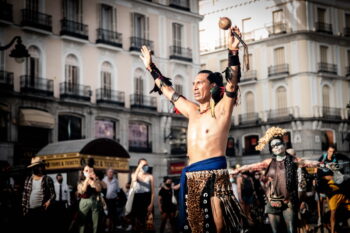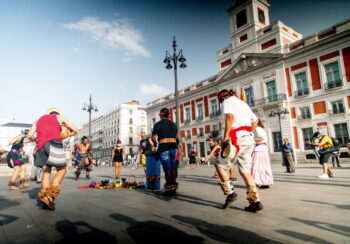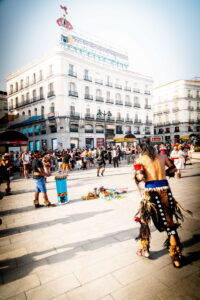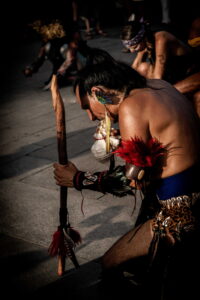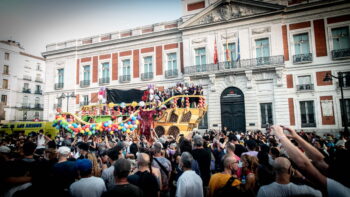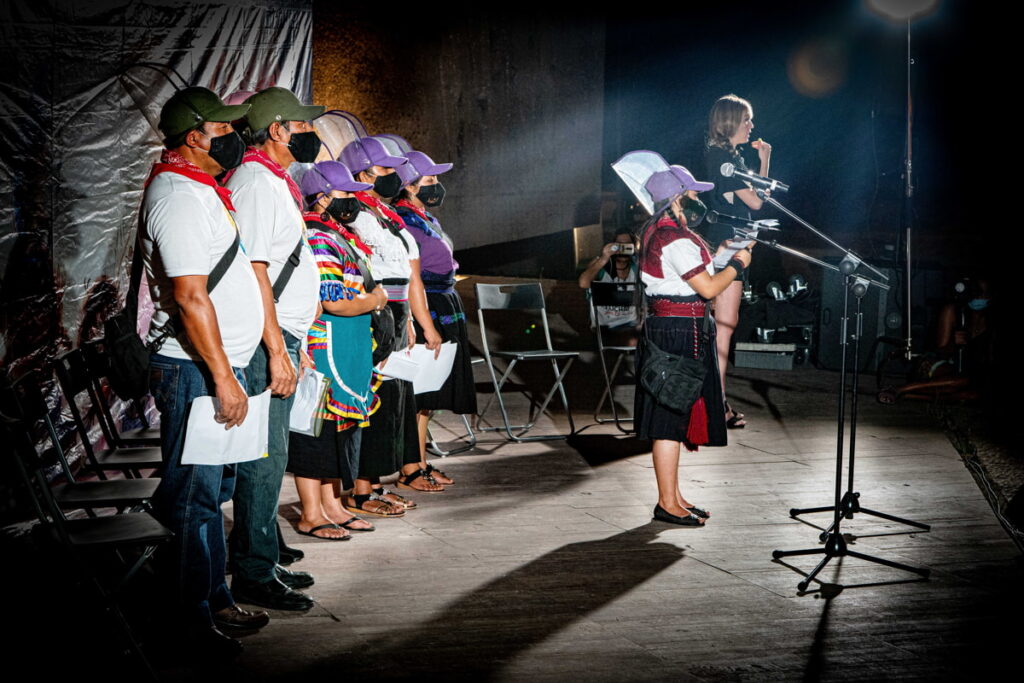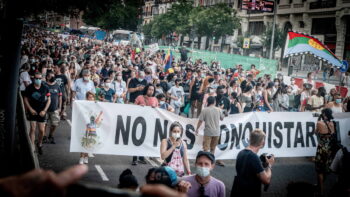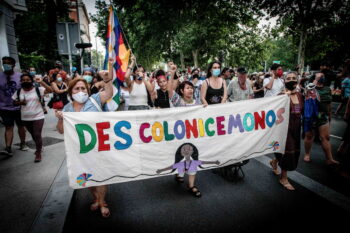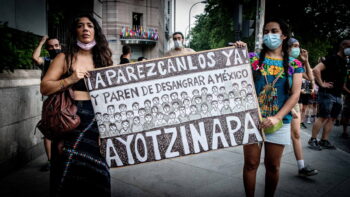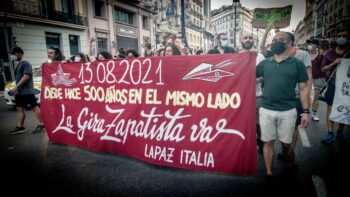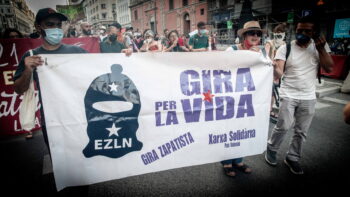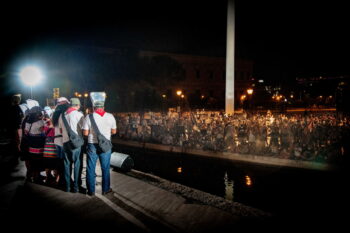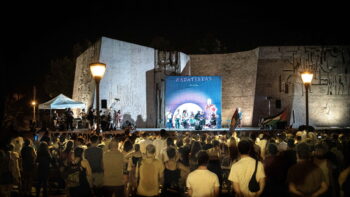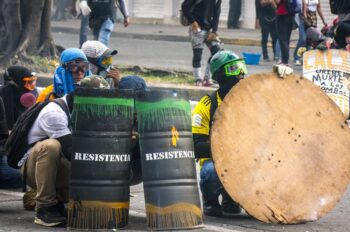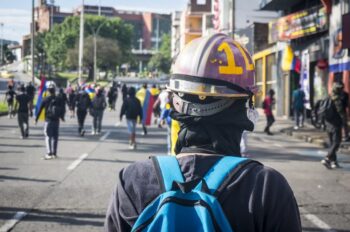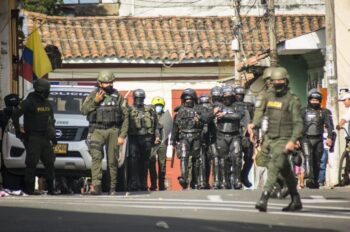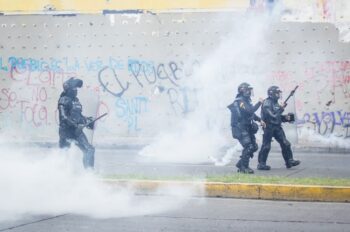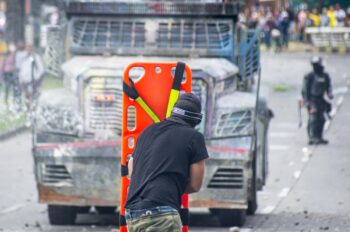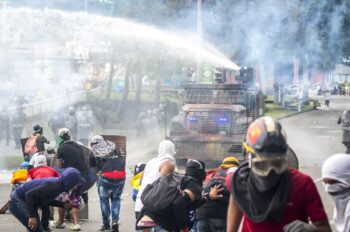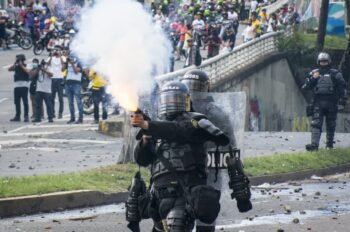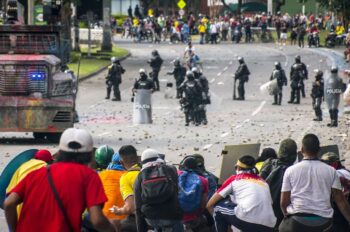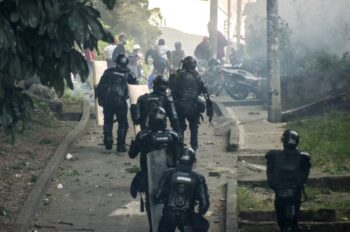
World
(Español) Cartas Naúticas IV. ‘Vinimos a aprender, vinimos a escucharlos’
Madrid, Agosto, 2021. En la Puerta del Sol, la histórica plaza en el hoy centro de Madrid, danzantes reproducen rituales mexicas y danzan al ritmo de los tambores.
[podcast]https://radiozapatista.org/wp-content/uploads/2021/08/RZ_Sonidos_Danza.mp3[/podcast]
En la misma plaza, una carroza-navío inicia su recorrido rumbo a la Plaza de Colón. A bordo, siete indígenas mayas provenientes del sureste mexicano, miembrxs del denominado Escuadrón 421, la avanzada marítima de la Travesía por la Vida zapatista. Con ellas y ellos, algo más de un millar de personas en alegre procesión.
[podcast]https://radiozapatista.org/wp-content/uploads/2021/08/RZ_Arranque.mp3[/podcast]
Es el 13 de agosto de 2021, y este día se cumplen 500 años de la caída de Tenochtitlán, la capital del imperio azteca, a manos de los conquistadores españoles liderados por Hernán Cortés. Las fechas, más allá de los hechos que en ellas sucedieron, son símbolos. Y los símbolos, tanto como los espacios físicos, son territorios disputados por las luchas de poder.
[podcast]https://radiozapatista.org/wp-content/uploads/2021/08/RZ_LaTierraRobadaSeráRecuperada.mp3[/podcast]
En marzo de 2019 el presidente de México le envió una carta al rey Felipe VI y al Papa Francisco exigiéndoles que pidieran perdón por la conquista, presumiblemente con el objeto de que el año del 500 aniversario de la caída de Tenochtitlán fuera el año de la “reconciliación histórica” a pesar de que México no existía en ese entonces y a pesar de que el México de hoy, que sí existe, continúa pisoteando, despojando y despreciando a los pueblos originarios.
Mientras tanto, para la derecha en España la caída de Tenochtitlán significa la heroica y generosa liberación de “millones de personas del régimen sanguinario y de terror de los aztecas”. Ambos polos simplifican y tergiversan una historia mucho más compleja y la utilizan para sus propios fines políticos, evocando un nacionalismo ramplón que divide al mundo en “buenos” (nosotros) y “malos” (ellos), aunque ni el nosotros ni el ellos hayan existido en la época ni quede muy claro a qué se refieren dichos términos en el presente.
En ese escenario irrumpe un pequeño grupo de rebeldes indígenas mayas, que hicieron el recorrido marítimo de la conquista en sentido inverso, que llegaron a las costas de Galicia el pasado 22 de junio, que tuvieron la osadía simbólica de renombrar el antiguo continente, que anuncian una “invasión” para escuchar y aprender, y que ahora “navegan” en una manifestación cuyo lema es: “No nos conquistaron”.
¿No nos conquistaron? ¿Qué significa eso? ¿Otro acto de demagogia? ¿Quién es el “nosotros” que el “nos” implica? El nosotros que el “nos” implica es amplio. Los pueblos indígenas de América, para empezar, que resistieron y resisten y seguirán resistiendo. Pero no sólo ellos. El “no nos conquistaron” significa, también, el desafío a la historia única, al sistema único, a la homogeneidad colonial y postcolonial, a los valores hegemónicos que constituyen los pilares del capitalismo, a la visión única que pretende regir el mundo único: el Universo.
El “nosotros” no conquistado se encuentra en las grietas, en los intersticios, en los abajos, en los márgenes, en la pluralidad jovial de la multiplicidad y la divergencia, en la vitalidad de la vida que se niega a ser enterrada bajo el asfalto del “progreso”, en la pulsión del encuentro ante la dictadura del individualismo, en la efervescencia de la memoria ante la dictadura del olvido, en el respeto, el cuidado y el amor ante el desprecio, el odio y la indiferencia, en la consagración de la vida ante el imperio irracional de una razón totalizadora, en la mirada y la escucha ante la ceguera y la sordera de la verdad absoluta.
[podcast]https://radiozapatista.org/wp-content/uploads/2021/08/RZ_LeyExtranjeria.mp3[/podcast]
Y es ese, precisamente, el sentido de esta gira: el encuentro de los nosotros no conquistados. Los muchos nosotros que nos insurgimos ante el desatino de un sistema mundo que, según nuestro análisis y nuestro dolor, ha perdido el rumbo. Pero en la soledad de nuestras pequeñas o grandes luchas no atinamos a vislumbrar una salida para el desatino de nuestra humanidad, porque la Hidra es inmensa y luchamos apenas contra una o algunas de sus cabezas. Sabemos que es tan enorme aquello a lo que nos enfrentamos, que nuestros pequeños esfuerzos jamás lo podrán derrotar, y si seguimos caminando es sólo por necios, por tercos, porque no tenemos otra opción, porque no nos rendimos, no nos vendemos y no claudicamos. Porque las generaciones venideras merecen una esperanza y para eso es necesario plantar semillas, aunque a veces nos parezca casi imposible que puedan germinar.
¿Pero qué sucede cuando las soledades se encuentran? ¿Qué sucede cuando las semillas se reúnen, cuidan y reproducen en más y más semilleros?
Desde hace casi un año, muchos nosotros se han encontrado para hacer posible esta gira, y en esos encuentros algo se gesta. Se generan oleadas de alcances imprevisibles. Por toda Europa, colectivos, organizaciones e individuos organizados en torno a una gran multiplicidad de luchas se articulan motivados por la provocación de esta Travesía por la Vida. Que los zapatistas sean el catalizador de esas oleadas se entiende: con el gobierno autónomo, la justicia autónoma, la salud autónoma, le educación autónoma, la producción y economía autónomas, con el pensamiento crítico, con sus encuentros de mujeres, de artes, de ciencias, con su construcción laboriosa de otro mundo posible, son ejemplo y prueba de que es posible crear alternativas al mundo único que se nos impone.
En la Plaza de Colón, frente al Monumento al Descubrimiento de América, lxs miembros del Escuadrón 421 dieron su palabra. Reiteraron que ellxs son sólo “el antecedente de un grupo más grande”, y anunciaron que “por partes” llegarán a Europa 501 delegadxs no sólo zapatistas, sino también miembros del Congreso Nacional Indígena y del Frente de Pueblos en Defensa de la Tierra y el Agua. Y dieron a entender que ese sería el último de los grandes actos, y que en adelante los encuentros serían más íntimos. “El mañana no se gesta en la luz. Se cultiva, se cuida y se nace en las sombras inadvertidas de la madrugada, cuando la noche empieza apenas a ceder terreno. Los terremotos que sacuden la historia de la humanidad empiezan con un ‘ya basta’ aislado, casi imperceptible. Una nota discordante a mitad del ruido. Una grieta en el muro.”
Escucha la palabra del Escuadrón 421:
[podcast]https://radiozapatista.org/wp-content/uploads/2021/08/RZ_PalabraEscuadron421_Madrid_Agosto_2021.mp3[/podcast]
Y también dejaron claro a qué vienen y a qué no vienen: “…no venimos a traer recetas, a imponer visiones y estrategias, a prometer futuros luminosos e instantáneos, plazas llenas, soluciones inmediatas. Ni venimos a convocarles a uniones maravillosas. Venimos a escucharles.”
Sabemos que la multiplicidad de los nosotros es riqueza pero también fuente de divisiones y desencuentros, y así lo reflexionaron lxs zapatistas. “Sólo una amenaza más grande, un dolor más terrible, una rabia mayor, es la que puede hacer que nos pongamos de acuerdo en dirigir esa rabia y ese dolor más arriba… de lo que hablamos las comunidades zapatistas es de una causa, de un motivo, de una meta: la vida.”
Cada pequeña lucha es una lucha por la vida. Y sólo en el encuentro de los muchos nosotros se podrá reinventar la vida. Sólo en el encuentro será posible destruir a la Hidra. Sólo en el encuentro habremos de reinventarnos y transformarnos en semillas que, algún día, de alguna forma, en algún lugar, habrán de florecer.
“Porque vivir no es sólo no morir, no es sobrevivir. Vivir como seres humanos es vivir con libertad. Vivir es arte, es ciencia, es alegría, es baile, es lucha.”
Imágenes Cucho Ramírez – https://inquietadoc.com/
Música de fondo en el audio de la palabra zapatista: El Naán – Los invisibles de Kolda- Álbum La Danza de las Semillas
(Español) El Caminar escuchando del EZLN en tierras insumisas de la Europa de abajo
Apenas 500 años después | Escuadrón Marítimo Zapatista / En voz de Yuli (6/7) from ¡Compas Arriba! on Vimeo.
Los de arriba no las creían capaces, pero las de abajo se la rifaron. “Vientos compas. ¡Qué chingonas son!”, se puede oír por ahí en el continente antes llamado la vieja Europa. En pocas palabras, quinientos años de experiencias rudas de racismo y de resistencia se resumieron en la escucha de las siete voces “cien por ciento zapatistas” de la primera delegación de bases zapatistas a Europa. La avanzada marítima del Escuadrón 421 está compuesta por la Comandanta Carolina y la Comandanta Ximena, por Lupita, ex coordinadora local y regional de jóvenes, por Yuli y Marijosé, ex formadoras de promotores de educación autónoma, y por Bernal y Felipe, ex miembros de las Juntas de Buen Gobierno. Ante los ruidos y los oídos europeos, nos pone de ejemplo su modo propio de caminar escuchando, en silencio, cuando resurge el sonido de su palabra, como lo anunció el 5 de octubre del 2020 el vocero Subcomandante Moisés, que se irá a decir al pueblo de España “que no nos conquistaron. Que seguimos en resistencia y rebeldía” (Sexta parte: Una Montaña en alta mar, EZLN).
Abajo y a la izquierda, del lado del corazón en Abya Yala, se siguen escuchando dolores causados por el odio a los pobres y el racismo estructural de un nacionalismo mexicano fiel al colonialismo eurocéntrico patriarcal (leer: El Estado mexicano y la memoria de los de abajo). Quinientos años después de la caída del imperio mexica, mientras el Congreso Nacional Indígena se movilizaba con acciones dislocadas, en especial en la Ciudad de México con la Coordinación Metropolitana Anticapitalista y Antipatriarcal con el Concejo Indígena de Gobierno (leer: “¡No nos conquistaron!” Pueblos irrumpen en inmediaciones de conmemoración por caída de Tenochtitlán), en tierras insumisas de las Europas de abajo, también el himno zapatista fue entonado y las consignas del Ejército Zapatista de Liberación Nacional, de norte a sur y del este al oeste, es decir de Escandinavia a la península ibérica y del oriente del continente hasta el océano Atlántico. Cueste lo que cueste, diversas acciones dislocadas ocurrieron en esta cálida e histórica tarde estival.
